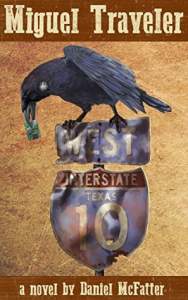
Tell us about your book.
Miguel Traveler is a post-apocalyptic novel that centers around Miguel Morgan, an oilfield worker from Houston in the year 2012, who suddenly finds himself in a desolate future where civilization has all but vanished. As he tries to unravel the mystery of how he ended up in the future, he must contend with the desperate remnants of mankind that inhabit his barren new world. Through trials with clever machines and eternal beings, Miguel comes to understand that the most difficult thing he has to face in this terrifying future is his own shocking past.
Why did you want to write a book?
Ever since I was a kid, I have loved telling stories in one fashion or another. With my debut novel, however, this thing started out as a short story that I shelved and rediscovered several years later. I decided to take a crack at finishing it, thinking I would try to sell it to one of the sci-fi mags. The story quickly snowballed into a large soulful narrative that had me by the heart strings.
What tips can you give other authors looking to self-publish?
Definitely hire an editor. I cannot stress this enough. At the very least, hire a copy editor. You owe it to yourself to tell the best version of your story possible. If you’re not willing to hire an editor, then you’re hurting yourself and your work more than you realize. Everyone has an editor. Patterson. Rowling. King. Even Cormac McCarthy has an editor. So should you.
As a writer, what is your schedule? How do you get the job done?
I don’t have a schedule, but I do have a minimum quota of words that must be completed daily and weekly. This is recorded in a word journal so I can keep track of my progress. As soon as I started doing this, I found it immediately improved my output. It is especially encouraging when you find yourself going above and beyond your quotas, but even hitting your bare minimum quotas in the word journal is satisfying. And it adds up faster than one might expect.
How do you deal with writer’s block?
Well, I’m definitely no subject matter expert, but I can share what worked for me. So, Miguel Traveler and its sequel are sprawling narratives with different sections. There is always an outline that has enough room for organic discovery to surprise me in fun ways. If you’re struggling with one part of the narrative, it can be very helpful to jump to a different section of the story and begin writing there. It is amazing how the sections can draw each other together, almost magnetically, not only helping with writer’s block, but making for a more seamless story in the end.
More on what works for me: I almost always write to instrumental music, usually music that matches some aspect of the mood or tone, or something that is just easy to “trance” to, for lack of a better term. I reread what precedes my current place and use the music to just slip into the flow of things and see where it takes me, not being afraid to try something new, even if I have no idea how it’s going to work. If it sounds bizarre, just give it a try. You can always delete it if it doesn’t work, but it just might be your muse whispering to you. After all, somewhere in time, your story is already written.
The other thing is knowing when you’re done for the day. When you’re done, you’re done. Come back tomorrow and start anew. Some days are one hundred word days. And you have to learn to accept that that’s okay. When you’re away from the manuscript on a one hundred word day or a zero word day, just lightly think about the book throughout your day, in the back of your mind. Nothing forceful—just light little touches with your thoughts. You’ll be surprised how helpful that can be when your start fresh the following day. Handcuffing yourself to the desk and assaulting yourself until your produce words is not something I would advise.

Miguel Traveler is definitely genre-bending. While it is a post-apocalyptic science fiction tale, it reads almost like a western—as many reviewers have pointed out. One reviewer described it as “Longmire meets The Walking Dead meets Lonesome Dove meets It.”
The other aspect is the unique narrative structure, which shares time between a dystopian wasteland and contemporary 21st century American South, as we explore our flawed protagonist from various moments in his life. But genre was never really considered at any point during the process. As soon as I began writing, Miguel was speaking. The very first thing that existed was this warm, rustic figure adrift in the milk, constantly telegraphing his thoughts to me. Everything else grew from there.
Why did you choose to use stream of consciousness in the narration of Miguel Traveler?
I think a natural biproduct of Miguel telling his story is that the narrative is expressed in the flow of his thoughts and feelings. But, there was no choice about how the story was told. The voice of the narrative was very organic, natural, and quite honestly the easiest part of telling this story.
If you want to write your own question and answer, do so here.
As Miguel begins to understand more about the Outfar and what he can do, why does he keep questioning himself about whether or not he is right about the path he has chosen?
Miguel awakens in a strange world under terrifying circumstances, only to discover that he has abilities and talents beyond anything he could have ever imagined. Couple that with having to reconcile very bad things that he did in the past, and I think you have a recipe for doubt and seeking answers, both within and without.
Did you plan to leave it open to interpretation about whether the memories from the first life were actual events or not?
That’s a very interesting question. There is certainly a dreamlike quality to the entire story that is intended for the reader, as they become an “active pilgrim” alongside Miguel. That being said, on a certain level of the narrative, I never considered that the 21st century chapters were up for debate as to whether they had actually occurred as Miguel recounted them to us. If we trust Miguel as a narrator, then we can reasonably accept that the events of the 21st century occurred as he described them. The more likely “up for debate” portion of the narrative always seemed to be the rather dream-like odyssey he was having in this devastated future where strange echoes and reflections from his past have a tendency to manifest in surprising ways.
What’s next for you as an author?
I am currently writing the second Miguel Traveler book, which picks up right where the first one ended. Exciting stuff.f
Author Links
Get an Editorial Review | Get Amazon Sales & Reviews | Get Edited | Get Beta Readers | Enter the SPR Book Awards | Other Marketing Services






















Leave A Comment